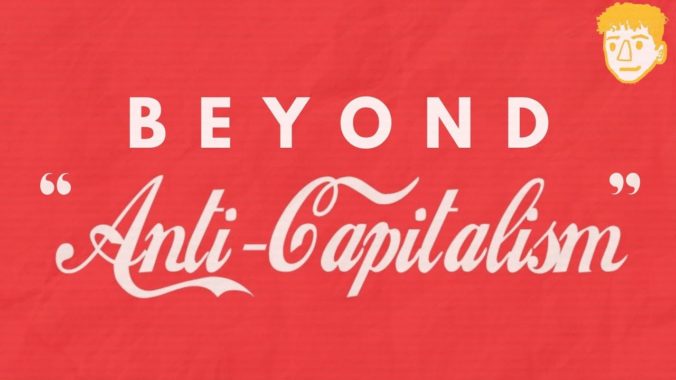The world has developed a few striking new features since 2020 – since the pandemic and the protests in response to the police murder of George Floyd. Among those features, here’s one that stands out to me: the rise of explicitly anti-capitalist branding within the capitalist system.
That is to say, people and companies use anti-capitalist messages, logos, and slogans in order to sell things to people or push companies and their workers toward efficiency and profit. So, we’re not just talking about Che Guevara t-shirts here.
It goes deeper than that.
A few years ago, I wrote about one facet of this that we might call ‘Woke HR.’ But let’s look into this a bit further.
The Fourth Spirit of Capitalism?
In the recent Jacobin article ‘The Church of Human Resources,’ Tyler Austin Harper took a closer look at these issues. He did so in light of a bizarre HR manifesto called The HR (R)Evolution.
As Harper reads the book, it argues that capitalism is well into the process of transcending its 90s version. What was that? You know, the one where we achieve autonomy and fulfillment through our careers. But the tech world – in its efforts to hollow out the economy and destroy middle income jobs via automation – put an end to that dream.
The new era – the so-called fourth spirit of capitalism – changes the game. Capitalism will perpetuate itself not through providing us with autonomous, fulfilling careers, but rather through achieving transformative moral aims.
On this idea, capitalism will solve climate crisis. It’ll provide us all with free time and a UBI. And it’ll do these things while also undermining the companies that skim the fat off the capitalism system, thereby building a world where we all live comfortable lives off of universal capitalist profit.
But that’s just the techno optimist side of the coin.
The Church of HR?
So, where does HR, specifically, enter the picture here? How does HR advance techno optimist projects or the allegedly transformative moral aims of the fourth spirit of capitalism?
For that, you have to look at the other side of the coin. HR ideology looks increasingly ‘woke.’ It uses social justice language, especially racial justice, in order to create the appearance that companies advance deep, structural change. Usually without making any real progress toward actual deep, structural change.
At least, that’s how I tell the story. Harper tells it a bit differently. He thinks the wokeness of HR rises to the level of a secular theology. It uses terms like ‘racial capitalism’ to build up the PMC as a pseudo revolutionary class within the U.S. economy.
Harper thereby builds out a world where the two sides of the coin of 2020s capitalism – techno optimism and woke HR – work together, but also struggle with one another for domination. Elon Musk represents the former, whereas someone like Robin DiAngelo or Ibram X. Kendi represents the latter.
Some Closing Thoughts
I think Harper’s story is a bit much at times. It’s extra, as the kids say.
How so? I don’t think ‘woke’ language in the workplace, particularly in HR, rises to the level of a ‘secular theology.’ That strikes me as a bit of an elevator word. It attributes to HR ideologues larger ambitions and intentions than they really have.
Here’s how I’d put it. The business world in general, and HR in particular, contain quite a bit of pseudo intellectualism, faux academic jargon, and many other pretensions to importance. Quite a few people in the HR world, especially in and around tech, pick up on trendy language. Since 2020, that trendy language comes from PMC radlibs and ultra progressives, including people in the ‘abolition‘ camp. To a large degree, this trendy language comes from racial justice movements.
So, HR uses lots of ‘woke’ language. But it’s not a theology. It’s just language they’re picking up from the broader culture. They picked up different language before 2020, and they’ll pick up different language later.
